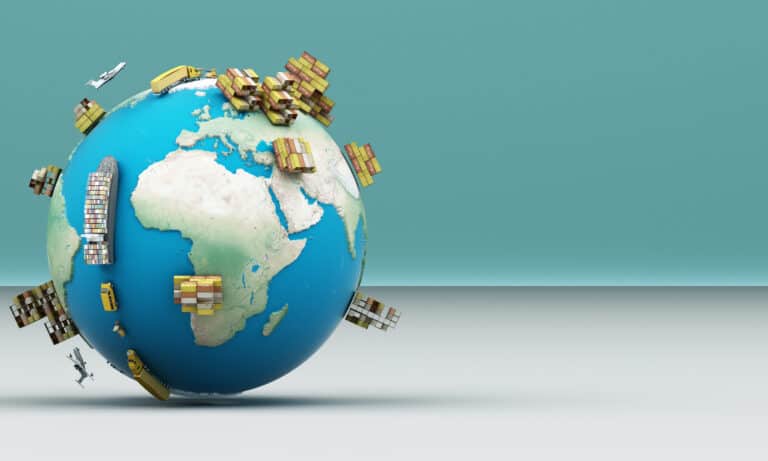
In 1980, Nobel Laureate and economist Milton Friedman championed global free markets as fostering “productive efficiency, harmony and peace among the peoples of the world” [1]. He made this statement while explaining how people and organizations from multiple countries cooperate in manufacturing of a pencil.
Since then, the world has come a long way having accelerated towards a globalized economy. The modern world is unimaginable without global supply chains which are present in nearly 80% of world trade. [2] Horizon is also a part of the global packaging supply chain, exporting its sack kraft paper products to valued partners in over 70 countries worldwide.
However currently, global supply chains are increasingly being disrupted due to various factors such as COVID-19 pandemic and international conflicts. Amongst these factors, climate change is perhaps the most critical as it is a long-term problem. We are already witnessing high inflation rates and shortage of essential supplies in many parts of the world as a result.
As the world inches closer to a climate catastrophe, disruptions in global supply chains are intensifying as follows:

– Extreme weather conditions lead to decrease in supplies. Italy, Spain and Portugal are experiencing extreme droughts this summer which have dried up the region’s important rivers of Po and Tagus. There is thus a water shortage and reduced supply of important produce such as olives, tomatoes and oranges.
– Extreme weather conditions drive increase in electricity and transportation costs. Hence, prices of goods would increase. There is a global rise in inflation. Eurozone, the US and UK among other regions are seeing record high levels of inflation rates.
– Changing climate cycles are already disrupting transportation services in the form of cancellations, delays and even service closures. Rising sea levels will pose problems for infrastructure in sea, rail and highway transportation.
– Extreme temperatures leads to harsher working conditions which would in turn disrupt workforce productivity in supply chain. This would lead to migration of workers from areas with extreme temperatures and thus a shortage of workers in such areas.
While reverting to a localized supply chain could seem like a solution to these problems, it is not entirely feasible today. Moreover, climate change is a global problem. No region on Earth is unsusceptible from its adverse effects. Therefore, the problem of climate change must be mitigated on a global scale.
In fact, global supply chains can help mitigate climate change risks and reduce disruptions if managed collaboratively and strategically. [3] This would help global supply chains to continue thriving.

Global supply chain networks have the following unique advantages:
– Ability to foster innovation:-
When global partners are cooperating as part of a supply chain, they have the ability to share knowledge and best practices. [4] They can benefit from this knowledge in improving processes and technologies, thus steering innovation. Global partners also have necessary contacts across the world which could aid another member in the supply chain in case of any disruption or urgent need.

– Ability to create a wide reaching ripple effect:-
Due to firms being closely connected with each other, industry trends or a fundamental requirement of one firm can ‘ripple’ across the entire supply chain globally.

Working strategically with these advantages, global supply chains can mitigate climate change risks as follows:-
– Global partnerships towards clean energy & energy efficiency:
Achieving a clean energy transition is key in reducing emissions, a major factor contributing towards climate change.
Companies can closely work together with financial institutions and government stakeholders to incentivize, promote and standardize use of clean energy sources internationally. Use of clean energy sources such as renewable energy reduces emissions, energy dependency and increases energy efficiency. This helps in mitigating climate change risks.

Multinational technology manufacturers are already innovating towards making technologies energy efficient. When businesses use such technologies, it in turn helps their products and services become energy efficient. Moreover, energy efficiency drives down costs. Thus, the entire supply chain across the world can strive for energy efficiency.
– Adoption of circular economy principles worldwide:
Supply chain partners’ ability to cause a ripple effect can drive implementation of circular economy principles throughout the global supply chain. Hence, a supply chain is converted into a green supply chain.
In sack kraft paper and packaging industry for example, it has now become the minimum requirement in most parts of the world that the product is recyclable or reusable. Moreover, companies creating products that allow for circular economy to thrive in a global value chain are often considered reliable international partners.

Horizon’s products are well known for their sustainable properties and contribute towards circular economy in packaging value chain in over 70 countries. For this reason, it is considered a reliable international partner for sack kraft paper products.
Through innovation and shared knowledge of global partners, companies can implement circular economy principles at all stages: product design, sourcing, manufacturing process and during/post-product use.
Circular economy helps supply chains achieve higher energy & material efficiency with reduced cost and waste while ensuring quality.
In order to achieve above objectives in all parts of the world, global partnerships are needed in ensuring coherent international compliance standards.
The most important thing in these trying times for global supply chains is working together towards a shared goal: mitigating climate change risks to carry out worldwide operations with minimal disruptions. Global supply chains could have what it takes to do so.

References:
[1] Milton Friedman – I, Pencil. (2012). Free to Choose Network. https://www.youtube.com/watch?v=67tHtpac5ws
[2] Müller, G. (2022, June). Working together on global supply chains can help prevent climate disaster. Industrial Analytics Platform. https://iap.unido.org/articles/working-together-global-supply-chains-can-help-prevent-climate-disaster
[3] Müller, G. (2022, June). Working together on global supply chains can help prevent climate disaster. Industrial Analytics Platform. https://iap.unido.org/articles/working-together-global-supply-chains-can-help-prevent-climate-disaster
[4] Müller, G. (2022, June). Working together on global supply chains can help prevent climate disaster. Industrial Analytics Platform. https://iap.unido.org/articles/working-together-global-supply-chains-can-help-prevent-climate-disaster
